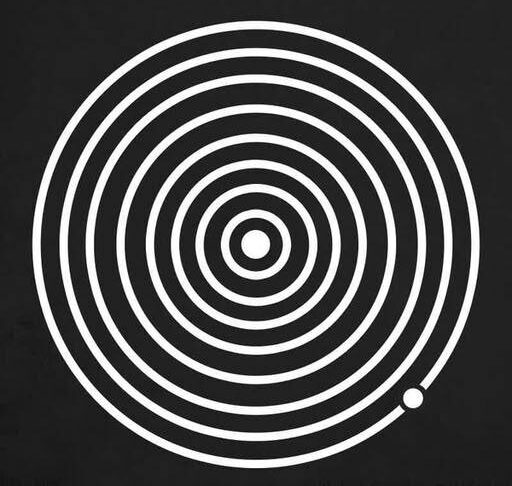If you’ve ever scrolled through social media, you’ve probably seen a post that claims, “The number of circles you see determines if you’re a narcissist.” Intrigued, you might’ve tried to count the circles, maybe even shared it with friends to see what they thought. But is there any truth behind this bold claim, or is it just another viral optical illusion?
In this article, we’ll dive into the world of optical illusions, explore the psychology of narcissism, and examine why we’re so drawn to these quick personality “tests.”
1. The Fascination With Optical Illusions
Optical illusions play tricks on our brains, making us see things that aren’t quite what they seem. These illusions challenge our understanding of reality and make us question how we perceive the world. Whether it’s the classic “duck or rabbit” image or the famous “grid illusion,” optical illusions are a captivating reminder that our brains don’t just passively receive information—they actively interpret it.
2. The Viral Circle Meme
The meme in question features concentric circles and a claim that the number of circles you see is tied to your level of narcissism. While it sounds intriguing, this idea is more of a fun trick than a scientific fact. Here’s why it works as a meme:
- Simplicity: All you have to do is look at the image.
- Bold Claim: Connecting visual perception to narcissism catches attention.
- Instant Feedback: People quickly interpret the image and can compare answers with friends.
- Shareability: It’s an easy-to-share conversation starter.
But does it actually mean anything? The answer: No.
3. Narcissism: What Does It Really Mean?
To fully understand why this meme doesn’t work, we need to unpack what narcissism actually is. Narcissism in clinical psychology refers to Narcissistic Personality Disorder (NPD), which is a serious mental health condition. Some of the signs include:
- A grandiose sense of self-importance
- A need for excessive admiration
- Lack of empathy
- Arrogant behaviors
The meme, however, oversimplifies this complex issue. It uses a visual trick to make us think we can diagnose narcissism based on how we view an image. In reality, identifying narcissism requires professional evaluation, not a quick glance at circles.
4. Perception and Personality
One of the more interesting aspects of the meme is the suggestion that what we see reflects who we are. While it’s true that personality can influence how we perceive things, such as how we interpret ambiguous images, this doesn’t mean that seeing a certain number of circles reveals anything about your character.
For example, people with certain personality traits may focus on different aspects of an image. But these differences are usually minor and influenced by context, mood, and attention—none of which are linked to narcissism.
5. The Roots of Personality Tests
The concept of using visual tests to uncover personality isn’t new. Projective tests like the Rorschach Inkblot Test or Thematic Apperception Test (TAT) have been used for years to explore the deeper layers of the psyche. However, these tests are highly debated and require professional interpretation. The circle meme, however, is a far cry from these sophisticated tools.
6. Why We Love Quick Personality Tests
In today’s fast-paced world, the idea that we can instantly understand something about ourselves is incredibly appealing. Social media makes these quick tests easy to share and even easier to become obsessed with. But while they’re fun and engaging, they rarely offer real insight into our personalities or mental health.
7. The Power of Suggestion and Cognitive Bias
A huge part of the meme’s appeal lies in the psychology behind it. Once we’re told that the number of circles we see can say something about us, we start looking for confirmation. This is known as confirmation bias—the tendency to search for information that confirms our pre-existing beliefs.
Additionally, the Barnum effect explains why we accept vague, general statements about ourselves. If the meme says, “Seeing X number of circles means you’re a natural leader,” we might feel that it applies to us, even though it’s a broad statement that could apply to anyone.
8. The Danger of Oversimplification
While optical illusions are fascinating and fun to explore, they should never be used to diagnose serious personality traits like narcissism. True psychological assessments require in-depth analysis and professional expertise.
The meme oversimplifies a complex psychological concept, and while it’s enjoyable to share with friends, we should be cautious about drawing conclusions about ourselves based on a single image.
9. Conclusion
The “Number of Circles” meme may be an entertaining way to spark conversation, but it’s important to approach it with a critical eye. Optical illusions are fun, and they do offer insights into how we perceive the world, but they are not tools for diagnosing narcissism—or any other personality trait.
So, the next time you see a viral meme claiming to reveal your deepest personality traits, remember: it’s all in good fun, but don’t take it too seriously!

Sophia Reynolds is a dedicated journalist and a key contributor to Storyoftheday24.com. With a passion for uncovering compelling stories, Sophia Reynolds delivers insightful, well-researched news across various categories. Known for breaking down complex topics into engaging and accessible content, Sophia Reynolds has built a reputation for accuracy and reliability. With years of experience in the media industry, Sophia Reynolds remains committed to providing readers with timely and trustworthy news, making them a respected voice in modern journalism.
